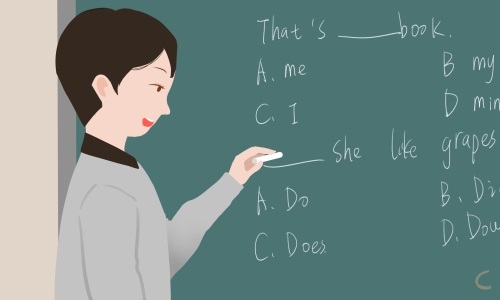八年级上册英语第二单元知识点整理
随着全球化的发展,英语已成为连接世界的桥梁,学好英语将有助于个人在职业、学术和文化等方面取得更多的机会和成功。以下是小编为大家带来的八年级上册英语第二单元知识点整理,欢迎参阅呀!

八年级上册英语第二单元知识点整理
一、词语:
1.matter: [′mætə]
1)名词 n. ① 事情;问题;事件[C]
It was a matter of life and death for them.这事对他们来说是生死攸关。
What is the matter with this car?这辆汽车出了什么毛病?
2)不及物动词 vi.
①(常用于否定句和疑问句)有关系,要紧。
②It does not matter(if…)(即使……也)不要紧 例如:
When talking about fighting battles, Comrade Liu Bocheng often quotes a Sichuan proverb "It does not matter if it is a yellow cat or a black cat, as long as it catches mice."
2.back: [bæk]
1)名词 n.① 背脊,背部[C](in and on 的用法)
Someone patted me on the back. 有人在我背上轻轻地拍了一下。
②后部[the S][(+of)]
Grandpa and grandma sat in the back of the car.
2)副词 adv..在原处;回原处
come back
形容词 adj. [Z]后面的,后部的
He sat in the back seat of the car. 他坐在车子后面的座位上。
3.Rest:[rest]
1)不及物动词 vi. 休息;睡; rests with sb ,
2) 及物动词 The doctor tried to rest his patient's mind at ease.
3) The rest of the eggs , have a rest
4、5.so: [səu]
1)副词 adv. 这么,那么;【口】多么,非常
I'm so pleased to see you. 看到你我真高兴。
2)连接词 conj. 因此,所以,它不能与because连用。
The monitor was ill so I went in his place班长病了所以我代他去。
3)I think the weather will be fine. ——I think so.
5.illness: [′ilnis]
名词 n. 患病(状态);身体不适[U]
During his illness, John stayed indoors.约翰在生病期间足不出户。
它是由形容词ill+名词后缀-ness构成,其同义词为sickness.
【拓展】类似的词有:
carelessness粗心;happiness幸福;darkness黑暗;kindness好意
6. Way ;
道路④方向 Come this way, please.请这边来。
【短语】1)on the/one'sway (to)…在去某地的路上。例如:
On the way to the airport,they hear the report.
7. angry:[′æŋgri]
形容词adj.愤怒的,生气的,其副词形式为angrily.
1)be angry with sb.生某人的气;2)be angry at sth.因某事生气。例如:
I was angry with him for keeping me waiting.
我对他很生气,因为他让我等了好久。
What are you angry at?你因何事生气?
The man left the room angrily.那个人生气地离开了房间。
8.western: [′westən]
西方的;来自西方的,它是west的形容词。 例如:
People in western countries have different traditions.
西方国家的人们有着不同的传统。
【积累】类似的词有:east——eastern东方的 north——northern北方的
south——southern南方的
9. It is important to do sth.
10.moment: [′məumənt]
名词 n. 瞬间;片刻[C]
Just a moment, she's coming. 请稍等,她马上来。
in a moment一会儿,马上;
at any moment随时,在任何时候;
at the last moment在最后关头;
at the moment此刻,(正在)那时;
for a moment片刻,一会儿
11. You are late for school.
12.until:[ən'til]
conj.&prep. (=till) 直到...时,到...为止
1) until
I waited until he came back.我一直等到他回来。
The war lasted until 1945.战争持续到1945年。
2) not … until
I didn't leave the boy until his mother turned up.
直到这孩子的母亲来,我才离开。
The noise of the street didn't stop until it was midnight.
街上的噪音直到半夜才停止。
2)当Not until位于句首时,句子要倒装。
Not until the teacher came in did the students stop talking.
3)not until的强调结构为:It is / was not until+从句/表时间的词+that+...。
It was not until the teacher came in that the students stopped talking.
二.短语
have a headache (患)头痛have a sore back 背痛
have a (bad) cold (重)感冒have a sore throat 喉咙痛
lie down 躺下have a stomachache 肚子痛
hot tea with honey 加有蜂蜜的热茶see a dentist 看牙医
two days ago 两天前 have a fever 发烧
be stressed out 紧张的 listen to music 听音乐
for example 例如No problem 没问题
too much + 不可数名词 太多的… much too +形/副 实在太…
too many + 可数名词复数 太多的…a balanced diet 平衡饮食
have a rest 休息
a few + 可数名词复数 少许… a little + 不可数名词/形/副 一点…
at the moment=now 此时,此刻 host family 寄宿家庭
good idea 好主意
healthy food 健康食品conversation practice 对话练习
a lot of 很多
三、重点句型:
1. I have a sore throat. 我喉咙痛。
2. Maybe you should see a dentist. 也许你应该看看牙医。
4. I’m stressed out. 我压力太大。
5. It’s important to eat a balanced diet. 平衡饮食很重要。
6. You should eat fruit and other healthy food.
你应该吃水果和其它的健康食品。
7. You should lie down and rest. 你应该躺下来休息。
8. I like to listen to music. 我喜欢听音乐。
9. I really need some conversation practice. 我的确需要一些对话练习。
10.I have a lot of headaches. 我头痛得很厉害。
11.What’s the matter (with you )? (你)怎么啦?
I’m not feeling well. 我感觉不舒服。
12.That’s a good idea. 好主意。
13.I hope you feel better soon. 我希望你尽快好起来。
Grammar:
5.知识“太多”“也”不多:
1)too many,too much与much too(太……)
1.Today,_____trees are still being cut down somewhere in the world.
A.much too B.too much C.many too D.too many (1999年辽宁中考)
2.He can't hear you because there is _____noise here.(1999年黑龙江中考)
A.very much B.too much C.much too D.so many
3.The sweater is very beautiful,but it's _____dear.(1999年吉林中考)
A.too much B.much too C.many D.more
2. 2)also,too,either与as well(也)
初二上册英语知识点梳理
have或has是助动词,has用于第三人称单数,其它人称一律用have。
疑问句
现在完成时的一般疑问句式是把助动词have或has提到主语之前。
回答:Yes, … have(has).
No, … haven’t(hasn’t).
否定句:
现在完成时的否定句式是“haven't(hasn't)+过去分词”。
3. 现在完成时的时间状语:already, just, yet, since, ever, never;
4. 与一般过去时的区别:一般过去时是强调动作在过去发生,而现在完成时是强调过去发生的动作对 现在造成了影响和后果。
5.一般过去时的时间状语:yesterday, just now, …ago, last week, 2 years ago,in 1980等。
例:
We planted (plant) some flowers in the garden last week.
I have sent (send) the letter.
He has come (come ) back home, he is watching (watch) TV now.
David finished (finish) his homework just now.
The monkeys are full, because we have fed (feed) them.
A: I have lost (lose) my purse!
B. Bad luck! When did you lose (lose) it?
A: I lost (lose) it last night.
与现在完成时连用的几个副词:already, just, ever, yet, never
肯定句: already, just
疑问句和否定句: ever, yet, never
yet 常置于句末
already, never, ever just一般置于助动词have/has之后,过去分词之前.
例:用 already, just或never, yet完成句子
1) I have been to many big cities, but I have never been to Shanghai.
2) Most of us have already finished our compositions.
3) Have they taken down the old pictures yet ? No, not yet .
4) He has already visited Beijing twice.
5) I have just heard the news. I know it.
7. 现在完成时中的for和since
(1)for + 一段时间(用How long提问)
We have known each other for ten years. 我们相识10年了。
(2)since + 句子/具体时间
since 引导的短语或从句用How long提问
①since+过去一个时间点(具体的年、月、日、钟点等)。
Tom has eaten nothing since yesterday.
②since + 一段时间+ago
We have been friends since five months ago. 从5个月前起,我们就成了朋友。
③since+从句,表示“自过去某个时间、某件事情以来”,从句时态:一般过去时。
I have lived here since I left Shanghai.
④It is+一段时间+since从句,表示“自从某件事发生已有一段时间了”。
It is two years since I left school.
8. 在含for或since引导的时间状语的现在完成时中,谓语动词只能用延续性动词。非延续性动词不能直接和for或since 连用。
leave --- be away die --- be dead
begin/start --- be on finish --- be over
come here --- be here go there --- be there
come back --- be back fall asleep --- be asleep
get to/ arrive/reach --- be (in) leave --- be away from
go (get) out --- be out open sth --- keep sth open
join --- be in+组织机构/be a member of+组织机构
fall ill --- be ill get up --- be up
catch a cold --- have a cold borrow --- keep
buy --- have get to know --- know
put on---wear
例:
1. The old man died 4 years ago.
The old man has been dead for 4 years.
2. It is 4 years since the old man died.
Four years has passed since the old man died.
3. He joined the Party 2 years ago.
He has been in the Party for 2 years.
4. I bought the book 5 days ago.
I have had the book for 5 days.
初二英语上册知识点归纳复习
Unit1Wheredidyougoonvacation?
1.goonvacation去度假
2.stayathome待在家里
3.gotothemountains去爬山
4.gotothebeach
5.visitmuseums
6.gotosummercamp
7.quiteafew
8.studyfor
9.goout
10.mostofthetime
11.tastegood
12.haveagoodtime
13.ofcourse
14.feellike
15.goshopping
16.inthepast
17.walkaround
18.becauseof
19.onebowlof…
20.thenextday去海滩参观博物馆去参加夏令营相当多为……而学习大部分时间尝起来很好吃玩得高兴当然给……的感觉;感受到去购物在过去四处走走因为一碗……第二天出去
21.drinktea喝茶
22.findout找出;查明
23.goon继续
24.takephotos照相
25.somethingimportant重要的事
26.upanddown上上下下
27.comeup出来
28.buysth.forsb./buysb.sth.为某人买某物
29.taste+adj.尝起来……
30.look+adj.看起来……
31.nothing…but+动词原形除了……之外什么都没有
32.seem+(tobe)+adj.看起来……
33.arrivein+大地点/arriveat+小地点到达某地
34.decidetodosth.决定去做某事
35.trydoingsth.尝试做某事/
36.trytodosth.尽力去做某事
37.forgetdoingsth.忘记做过某事/
38.forgettodosth.忘记做某事
39.enjoydoingsth.喜欢做某事
40.wanttodosth.想去做某事
中考英语快速提分方法
1、在中考英语备考时,首先静下心把英语老师给你的练习卷子甚至做过的一些练习题里的错题整理出来,专门抄写在一个本上,然后自己把错题重新再做一遍。这个本的正面一页是错题的原题,背面是答案,这样错题本就可以反复使用。做完以后就可以发现自己还有哪些不明白、不准确的都要做一个记录。直到得到正确的解答,可以把这道题先暂时放一下,过两天,拿出来再做一遍。这叫做排除错题,减少自己错误率的方法,是复习语法的好方法。
2、培养语感很重要,你可以每天坚持读诵半小时,大声地朗读和背诵所学过的课文、对话、单词,通过朗读和背诵进行听、说训练。如果有磁带的话,可以每天坚持边听磁带、边做题,把学过的课目做一次全面复习。
3、了解考试,一般来说,中考考题中70%应该是基础题,20%为中等题,10%才是难题。所以,应该把复习重点和考试时花得最多的时间,放在阅读文章、完形填空和写作上,你应在这些方面多多练习。
4、重点是要背单词,单词是基础。
5、然后是语法,多背多看语法,在上学的路上、洗漱的时间,可以看看语法,或者找一个固定的时间或晚上背语法。
6、多做题。训练听力要提前看题,要集中注意力去听。单选、完形、阅读可以买专门的题来做。
7、会语法,自然就能练成句子,作文也就没问题。如果在写单词时,一时想不起怎么拼写,就要换一个意思相同用法相同的词来代替,或者直接换一个句子。
中考英语答题技巧
听力答题技巧:
1、勾划题重点,关键词,特别是一般疑问句的答语。
2、做好笔记,学会记下数字,比如时间,数字,年份等,因为很多时候关于数字需要进行计算,而不是简单的答案。
3、听短文时,特别注意题目的关键词,以及选项的关键词,带着问题有目的地听短文,没听到的及时看下一题,等下一遍的时候再做之前没做的。
完形填空解题技巧:
1、第一遍要通读全文,掌握大意,不用急着做题。
2、抓住结构、语意及逻辑三条线索,推断和预测选项。利用上下文的提示,用学过的`知识和已有的生活经验,扫清部分词汇理解上的障碍。必须从空缺句的内部结构入手,从语法、词语固定搭配、词形变化等角度考虑,务必使所填的单词准确无误。
3、要特别注意语法,如单词的各种形式的变化,种类句型的结构等。
4、选项填完后,通读全文,仔细检查。验证答案,修正错误,着重注意这几点:
(1)文章是否顺畅;
(2)所填单词是否是最适合的单词;
(3)所填单词搭配是否有误。
英语作文写作技巧:
1、认真审题:弄清楚该题目究竟要表达什么,吃透要求,选好人称、有提示词,不要漏掉提示词语。
2、语言地道:尽量使用你初中读本中学过的句子、常用的短语、习惯用法。表达要正确。
3、不要跑题:理解脉络,抓住重点。
4、仔细检查:注意时态、语态、人称是否上下文一致,单词是否有单复数的错误,拼写的错误,字数是否达到要求等。
八年级上册英语第二单元知识点
上一篇:八年级上册英语第九单元知识点
下一篇:返回列表






